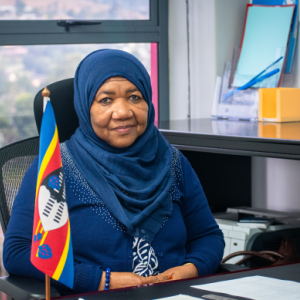Your Excellency, Hon. Minister of Economic Planning and Development,
Principal Secretary,
Government officials,
Development partners,
Private sector,
Academia,
The media,
Ladies and gentlemen,
A very good morning to you all.
On behalf of the United Nations Family, it is with a great sense of solidarity, honor and privilege to be with you all today, as the Kingdom of Eswatini embarks on yet another journey of preparing the nation’s Sustainable Development Goals (SDGs) Voluntary National Review (VNR).
It is indeed commendable that Eswatini has mainstreamed Agenda 2030 as well as Agenda 2063 into its National Development Strategy and National Development Plan. This is a clear demonstration that the Kingdom is committed to become one of the leading pioneers and role models to achieve SDGs in Africa.
As we recall, this is the second VNR to be prepared by Eswatini. The country was among the 47 nations to present its VNR at the High-Level Political Forum (HLPF) in July 2019. At that time, the country had prioritized 10 SDGs in line with national priorities as well as priorities set by the high level forum.
These prioritized included: SDGs 1 – ‘No Poverty’, SDG 2 – ‘Zero Hunger’, SDG 3 – ‘Health and Well-being’, SDG 4 – ‘Quality Education’, SDG 6 – ‘Clean Water and Sanitation’, SDG 7 – ‘Affordable and Clean Energy’, SDG 8 – ‘Decent Work and Economic Growth’, SDG 9 – ‘Innovation, Infrastructure and Industrialization’, SDG 13 – ‘Climate Action’ and SDG 16 – ‘Peace, Security and Justice’ and SDG 17 – ‘Partnerships for the Goals’.
Eswatini had identified poverty as the leading cause for economic instability in the country and the dimensions in the prioritized SDGs presented an opportunity to create a better future for all Emaswati.
The VNR is a critical process in monitoring the implementation of the 17 SDGs in all countries. It helps countries to reflect on progress, obstacles and opportunities in the realization of Agenda 2030. The High-Level Political Forum, which meets under the auspices of the UN Economic and Social Forum (ECOSOC), is ultimately responsible for the review of countries’ VNRs.
The VNR is a voluntary process that is led by the state. I would like to congratulate the Minister of Economic Planning and Development, Dr. Tambo Gina, and his team for their determination and commitment towards this process.
I would also like to assure the Minister that the UNCT in Eswatini will continue to support this important process through the technical leadership of UNDP, one of our 16 agencies operating in the country.
The VNR will aim to develop a unifying long-term vision and increase buy-in for sustainable and transformative solutions. Whilst conducting the Review,it is imperative that we “think globally and act locally”, underlining the critical role of local government in determining solutions in areas such as: urban planning, housing, education, innovation, social protection, food security, safety and access to justice.
This year, Eswatini is amongst about 45 countries to conduct and present the VNR under the HLPF theme, which is: ‘Building back better from the coronavirus disease (COVID-19) while advancing the full implementation of the 2030 Agenda for Sustainable Development,” . This is indeed another milestone to be achieved by Eswatini despite the numerous challenges we face.
It is pleasing note that an in-depth review of SDGs 4 – ‘Quality Education’, SDG 5 – ‘Gender Equality’, SDG 14 – ‘Life Below Water’, SDG 15 – ‘Life on Land’ and SDG 17 – ‘Partnerships for the Goals’ will be undertaken at the HLPF in July 2022, with much attention paid to the impact of the COVID-19 pandemic on all SDGs.
This Review will serve as an instrument to augment a holistic and interdependent nature of the Agenda 2030 for Sustainable Development at the national level.
Significant to the difficulties we have endured throughout the COVID-19 pandemic, the Reviews serve a fundamental role in maintaining the momentum needed to achieve Agenda 2030 with less than 8 years remaining.
Eswatini’s Review is also critical in ensuring that we Leave No One Behind in the nation’s recovery from the COVID-19 pandemic and beyond.
In the words of the UN Secretary-General, Mr António Guterres; "Everything we do during and after this crisis must be with a strong focus on building more equal, inclusive and sustainable economies and societies that are more resilient in the face of pandemics, climate change, and the many other global challenges we face."
We must therefore do all that we can to ensure that the nation’s VNR serves as an instrument to promote open and inclusive dialogue amongst all stakeholders and encourages participation in the implementation of Agenda 2030, as well as provides an example of an effective evidence-based review.
The United Nations Development System in Eswatini is delighted to be a part of today’s commencement of the development process of Eswatini’s VNR 2022: a process which will allow incredible learning opportunities and ultimately, contribute to an SDG-focused and sustainable recovery from the COVID-19 pandemic for our people.
It is only in solidarity, and with ambitious action to achieve Agenda 2030, that we will ensure a better future for all, including every Liswati. In the UNSDCF 2021-2025, whose implementation started in January 2021, the UN Family and Government have committed to “a prosperous, just and resilient Eswatini where no one is left behind”.
We look forward to the development of an impactful and effective Voluntary National Review that will also give further guidance to the implementation of our Cooperation Framework.
I thank you.


















